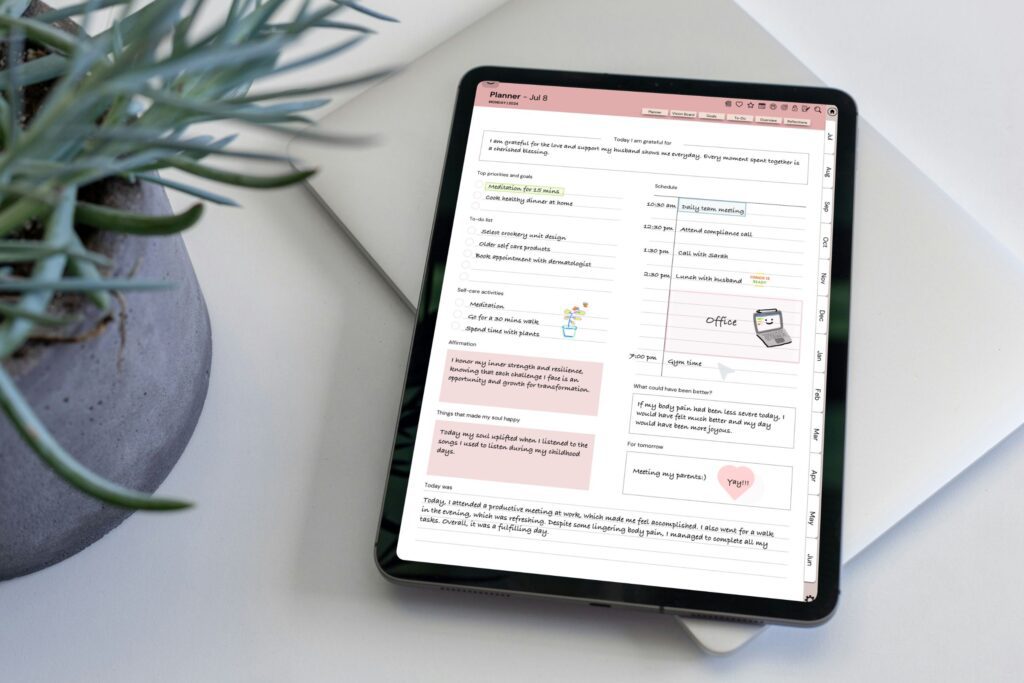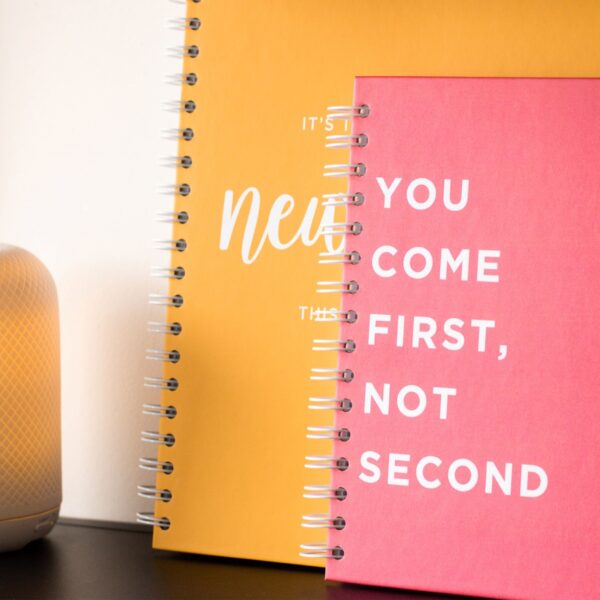Have you heard the story of the two wolves? Once there was a wise Cherokee elder who was teaching his grandson about life.
One day, the elder sat the boy down and said, “Inside each of us, there are two wolves that are always fighting. One of the wolves is bad, he’s full of anger, jealousy, bitterness, and self-doubt.
The other wolf is good, he’s kind, loving, peaceful, and full of hope.”
The boy listened carefully and thought about what his grandfather said. After a while, he asked, “Which wolf wins the fight?”
The elder smiled and said, “The one you feed.”
We all have different thoughts and emotions fighting for attention in our minds.
Some of these thoughts are negative, full of fear, doubt, and criticism. These are the thoughts that tell us we’re not good enough, that we’re going to fail, or that other people are better than us. This is the “bad wolf” talking.
But there’s another side to us, the “good wolf” that’s filled with positive thoughts and feelings. This side reminds us that we are capable, worthy, and strong.
It tells us that even when things are tough, we can get through them.
The idea is that we get to choose which side we listen to the most. If we keep paying attention to the negative voice, the bad wolf gets stronger and takes over.
But if we focus on the positive voice, the good wolf wins. It’s all about what we feed with our attention and energy.
We all have an inner critic inside us, that voice that makes us question ourselves and brings us down. But there’s also a good voice inside, encouraging us and reminding us of our strengths.
We must understand that while both are always there, the one we choose to focus on can shape how we feel about ourselves and how we face life’s challenges.
It’s just part of being human. No matter who you are or what you’re doing, that inner fight never really stops.
When we first thought about starting this blog, we went through the same struggle. We doubted ourselves and questioned whether we could even pull it off.
Neither of us had ever written anything like this before. We had no clue about content creation or what it would take to make this work.
The inner critic started throwing all sorts of questions our way, “Can we really do this?” “What if no one reads it?” “Are we even good enough?”
We knew it wouldn’t be perfect, but we decided to push past those doubts and give ourselves permission to start, an imperfect blog, yes, but a start nonetheless.
And if you’re reading this right now, that’s proof that good things can happen when you push through those feelings of self-doubt that your inner critic stirs up.

And it’s not just us. Even accomplished people like Albert Einstein, Michael Phelps, and J.K. Rowling have wrestled with that negative voice in their heads. Yet, they didn’t let it stop them.
They kept going, despite the doubts. That shows us that no one is immune to self-doubt or the inner critic, no matter how successful they are.
If you’re waiting for the day when you’ll stop doubting yourself or never hear your inner critic again, I’m sorry to tell you, that day’s not coming.
Self-doubt will always be there. You’ll question yourself in everything you do and every decision you make. But that’s okay. The key is not to get rid of the inner critic, because you can’t.
Instead, what you can do is learn how to feed the good wolf, to focus on the positive voice that lifts you up instead of the one that tears you down.
And that’s exactly what we’re going to explore in this blog, how to feed the good wolf, even when the bad one seems loud.
Welcome to our blog on how to overcome self-doubt and build confidence. Let’s start by understanding what is self-doubt and then we can discuss different ways to overcome it and build self-confidence.
Table of Contents
What Is Self-Doubt?
Self-doubt is that nagging voice in your head that makes you question yourself. It’s the little whisper that pops up and says, “Are you sure you can do this?” or “What if you fail?”
Maybe you’re starting something new like a project or a job, and suddenly you feel unsure if you’re capable.
Or maybe you’ve been doing something for a while, but that negative voice still makes you feel like you’re not good enough.
It’s when you start second-guessing your decisions, worrying that you’re not smart enough, talented enough, or experienced enough to succeed.
We’ve all been there, whether it’s a small moment of hesitation or a full-blown crisis of confidence.
Self-doubt is part of the human experience and it affects everyone, no matter how accomplished or confident they may seem.
Even the most successful people have dealt with self-doubt at some point in their lives. It’s that inner critic working overtime to make us feel uncertain and hold us back from taking risks or moving forward.
But the interesting thing is that self-doubt isn’t always a bad thing. In small doses, it can actually push us to improve, to think things through, and to prepare better.
The problem is when it becomes overwhelming and stops us from trying at all. That’s when we need to step in and learn how to manage it, so we don’t let it take over.
What Are the Causes of Self-Doubt?
Self-doubt doesn’t just show up out of nowhere. There are usually certain things that trigger it and make that inner critic louder.
Let’s try and understand these triggers so you can manage them better.
1. Past Experiences
One of the most common causes of self-doubt is past experiences. If you’ve failed at something before or faced criticism in the past, it can make you feel uncertain the next time you try something similar.
Those memories of failure or rejection often stick with us and feed into our self-doubt. We start to think, “If it didn’t work out last time, why would it work now?”
2. Comparison
Another big factor is comparison. We live in the world of the internet and social media where we often compare ourselves to others.
We see other people’s successes, their achievements, and their highlight reels, and it makes us feel like we’re falling behind.
We start questioning ourselves: “Why am I not as successful as them?” or “What if I’m not as good as they are?” This constant comparison can make self-doubt grow.
3. Perfectionism
Perfectionism is another major cause. When we set unrealistically high standards for ourselves, we feel like nothing we do is ever good enough.
Even small mistakes or imperfections can make us question our abilities. The need to be perfect can paralyze us and prevent us from even trying because we’re too afraid of falling short.
4. Fear of the Unknown
Finally, fear of the unknown plays a big role. Whenever we’re stepping into something new or unfamiliar, it’s natural to feel unsure.
We don’t know what’s going to happen or whether we’ll succeed, and that uncertainty fuels self-doubt. The inner critic thrives on fear, and the unknown gives it plenty to work with.
How to Overcome Self-Doubt and Build Confidence
Self-doubt doesn’t have to control your life. While it may always be there in the background, there are practical ways to manage it and build your confidence so that the positive voice, the good wolf, becomes stronger.
1. Understand Self-Doubt as Part of Being Human, and Part Of The Process
The first step to overcoming self-doubt is acceptance. Instead of fighting against it or feeling ashamed when it shows up, understand that self-doubt is a natural part of being human.
Everyone, no matter how successful, has experienced it at some point in their lives. The difference between those who succeed and those who don’t isn’t the absence of self-doubt, it’s how they handle it.
Self-doubt serves a purpose. It’s there to keep us safe and to prevent us from making mistakes that could lead to failure or embarrassment.
Our brains are wired to protect us from risks, and self-doubt is one of the ways of protecting us. It’s that little voice saying, “Are you sure you want to do this? What if it doesn’t work out?”
But making mistakes is part of life, and it’s how we grow. Every person who has achieved something great has made mistakes along the way.
They’ve doubted themselves, just like you and me, but the key is that they didn’t let that doubt stop them.
Instead of seeing self-doubt as an enemy, try to see it as a companion on your journey. It’s a reminder that you’re stepping into new territory, and with new territory comes uncertainty.
That’s okay. It’s part of the process. Accept that you will make mistakes, and that’s how you’ll learn and improve. What truly matters isn’t whether or not you doubt yourself, it’s what you do next.
Will you let the doubt paralyze you, or will you move forward anyway?
Acknowledge it but don’t let it dictate your actions.
Shift your mindset so you know that doubt will come, but it doesn’t have to control the outcome.
2. Challenge Your Doubts and Rediscover Your Potential
As we just discussed self-doubt is there to protect us from failure and embarrassment, it often comes from our past experiences.
The doubts you have about yourself like your abilities, your potential, and your worth, are usually based on a narrative you’ve built in your mind over the years.
Maybe it’s something someone said to you, or perhaps it’s a failure you experienced that still haunts you. But just because you’ve doubted yourself in the past doesn’t mean it’s the truth.
While your inner critic may be trying to protect you from failure, it shouldn’t limit you from trying new things.
The only way to really know what you’re capable of is by pushing through those doubts and giving yourself the chance to grow.
Yes, you might make mistakes, and yes, things may not work out perfectly the first time or even the second or third time. But you get closer to achieving your goals and building confidence with each attempt.
Each one of us has the potential to achieve their dreams, no matter how big or small they are. For some, it may take five tries, for others it might take ten or more.
But the key is to keep going. Don’t let your inner critic define what you can or can’t do. Each time you doubt yourself, remind yourself that the only real way to discover your capabilities is by trying.
The more you try, the more you’ll learn, and eventually, you will get where you want to be.
A great way to start challenging your doubts is by practicing affirmations. Positive affirmations can help shift your perception of yourself.
When you regularly tell yourself that you’re capable, worthy, and strong, you start to believe it. Over time, this can silence the negative voice in your head and replace it with one that encourages and uplifts you.
Related Blogs on affirmations:
- What Are Affirmations and How Do They Work?
- How To Write Positive Affirmations for Personal Growth and Self-Improvement
- How To Write Powerful Affirmations for Manifesting Your Dream Life
- How to Write Mindfulness Affirmations to Live in the Present Moment
- How to Write Gratitude Affirmations for a Happy and Thankful Life
3. Reflect on Your Journey and Develop a Growth Mindset
Self-reflection is an excellent way to overcome self-doubt as it reminds you of everything you’ve achieved in your life so far. It shows you that you’re capable of far more than your inner critic might suggest.
It doesn’t mean you have to dwell on the past and forget about the present moment, just take a moment to look back and learn from your experiences.
What have you already done that you once thought you couldn’t? How did you overcome the challenges?
Focus on the lessons you’ve learned in those times and use them to build the confidence to face new challenges.
Self-doubt generally makes us forget our past achievements but reflection helps us reconnect with those moments of success.
The key is to embrace the mindset that you’re always growing and improving. With each new challenge, you have the opportunity to learn something new.
Instead of seeing difficulties as threats to your confidence, see them as stepping stones for improving yourself as a person.
One of the best tools for self-reflection is journaling. It’s an excellent way to document your journey and reflect on your achievements and learnings.
Related blogs on journaling to help you understand this practice in detail:
- What Is Journaling and What Are Its Benefits?
- What Are The Different Types of Journaling
- 5 Simple Steps to Start Journaling for Mental Health
- How and Why You Should Start a Gratitude Journal
- How to Journal for Personal Growth and Self-improvement
- What Is a Manifestation Journal and How to Journal for Manifestation
- How to Start a Health and Wellness Journal
- How Can Journaling Boost Your Productivity
- How to Journal for Overthinking
- What Is a Morning Journal and How to Journal in the Morning?
- Journaling vs. Keeping a Diary: What’s the Difference?
- The Pros and Cons of Journaling
If you’ve been following us for a while, you know that both of us started journaling a few weeks ago, and we can personally vouch for its benefits in different aspects of our lives.
Journaling has helped us track our progress, understand our feelings, and boost our confidence.
We’ve been using our own mindful living digital planner that we designed ourselves to incorporate practices like mindfulness, gratitude, affirmations, and self-care.
It helps us set yearly, monthly, and weekly goals, organize our days, and keep track of our health and well-being.
If you’re looking to buy one for yourself, we invite you to check out ours.

4. Find Your “Why” to Push Past Self-Doubt
The next and very important step in overcoming self-doubt is figuring out your “why.”
When you truly understand the reason behind what you’re doing, it becomes easier to push through those moments of doubt and fear of failure.
We all have personal reasons for setting goals, maybe you want to create a better life for yourself and your family, or maybe you’re working toward sending your kids to a good college and giving them the opportunities you’ve always dreamed of.
When you know your “why,” it reminds you of what really matters and gives you the courage to take action even when you start to second-guess yourself. Your “why” helps you see the bigger picture.
Without that sense of purpose, it’s easy to get stuck in doubt and question your abilities. But when you’re clear about why you’re doing something, your inner critic loses some of its power.
Your “why” also gives you the strength to face failure head-on. When you have a strong reason behind what you’re pursuing, failure becomes less of a threat and more of a learning opportunity.
You know that each setback is a stepping stone toward something greater.
You know that no matter how many times you stumble, your reason for trying is too important to give up on.
5. Set Achievable Goals and Celebrate Your Wins
The next step in the process of building confidence and overcoming self-doubt is setting realistic and achievable goals and celebrating your progress along the way.
Whatever you have envisioned for yourself, start by setting goals that are within your reach so that you feel more in control. If you aim too high or expect everything to happen all at once, you’ll feel overwhelmed.
But if you break down your end goal into smaller and manageable goals, it will be easier to manage and track and each win will give a boost to your confidence.
Wherever you are right now in the journey or in your life, start by setting clear and specific goals that are realistic at that point in life.
These goals could be learning a new skill, improving a habit, or hitting a milestone in your personal or professional life.
Whatever it is, make sure it’s something you can realistically achieve in the short term. Each time you accomplish one of these smaller goals, take a moment to acknowledge it.
Celebrating your wins, no matter how small, is important for building momentum and reminding yourself that you’re making progress.
Taking a moment to recognize what you’ve achieved helps you shift your focus away from self-doubt and towards what you’re capable of.
It doesn’t have to be anything big, sometimes just ticking something off your to-do list is enough to remind yourself that you’re moving forward.
And those little victories add up over time and help you build the confidence you need to overcome bigger challenges.
Remember, it’s not about being perfect or reaching your ultimate goal overnight. It’s about recognizing your efforts and celebrating your journey.
Each win, no matter how small, is a step in the right direction. So set those goals, achieve them one by one, and give yourself the credit you deserve along the way.
6. Surround Yourself with Positive Support
You’ve probably heard the saying, “You are the sum of the five people you spend the most time with.” There’s a lot of truth to that.
If you surround yourself with negative people, those who make fun of your ideas, are jealous of your ambitions, or have completely different goals from yours, it’s going to be much harder to make progress.
These kinds of people feed the bad wolf we talked about earlier, the one that thrives on self-doubt and holds you back.
We must understand that life isn’t meant to be a solo journey. Well, maybe for a few people but for most of us, we need the right people by our side. So surround yourself with people who bring out the best in you.
These are the people who help you feed your good wolf, the ones who believe in you, cheer you on, and give you the confidence boost you need when things get tough.
And positive support doesn’t have to be just from family and childhood friends, it can also be from your mentors and colleagues. In today’s world, it could even be from an online community that shares your interests and goals.
These people should understand what you’re striving for and offer encouragement when you need it most.
They should remind you of your strengths, help you see things from a different perspective, and push you to keep going when self-doubt tries to creep in.
The truth is, we all need that kind of support.
Having people in your corner who genuinely want to see you succeed can give you the strength to overcome self-doubt and move forward with confidence.
Take a look at the people around you. Are they lifting you up or holding you back? If it’s the latter, it might be time to seek out more positive influences that help you grow and thrive.
7. Practice Mindfulness to Let Go of the Past
Sometimes, the main reason we have self-doubt is because of some incident that might have happened in the past.
Maybe you froze on stage during a big speech, stumbled over your words, failed an important test, or made a mistake that embarrassed you.
These moments, no matter how small or big, can fuel self-doubt and feed the bad wolf. They become reminders of what went wrong and make us question whether we can succeed in the future.
But the thing is, the past is exactly that: the past. It’s already happened and there’s no way to go back and change it.
The only place it lives now is in our memories. While I get that it can be tough to shake off those old and uncomfortable moments, the beautiful truth is that they’re over.
They’ll never come back. And if we keep dwelling on them, it’s like giving power to the bad wolf over and over again, which makes it harder to overcome self-doubt.
One of the best ways to stop getting caught up in those negative memories is by practicing mindfulness.
Mindfulness teaches us how to live in the present moment. It’s not about ignoring your past experiences but rather learning how to observe your thoughts and emotions without letting them control you.
It helps you step back and see those past events for what they are, just memories, not something that defines your future.
When you practice mindfulness, you create space between yourself and your inner critic. You stop letting those old memories dictate how you feel about yourself right now.
Instead of being trapped in the cycle of doubt and fear, mindfulness helps you focus on the present and move forward with confidence.
It’s a powerful tool that can quiet the negative voice in your head and help you stay grounded in the moment.
Some blogs on mindfulness and mindful living:
- What Is Mindfulness And Why Mindfulness Is A Superpower
- What Is Mindful Living And How To Live Mindfully
- What Is Mindfulness Meditation And How To Do It
- How To Practice Mindfulness In Your Daily Life
- 7 Healthy Habits to Live a Mindful Life
- 5 Indispensable Mindful Living Tools
- 7 Ways to Reduce Stress Through Mindful Living
Wrapping Up – How to Overcome Self-Doubt and Unlock Your Full Potential
I’m not here to sugarcoat things or give you false hope by saying that it is easy to overcome self-doubt and build confidence. It will take a lot of courage and effort from your end to stop feeding the bad wolf.
The best way to start is by taking stock of where you are right now and mapping out where you want to be. Create a plan for yourself, for the next month, quarter, and year. As we discussed throughout this blog, set meaningful and realistic goals.
The moment you step out of your comfort zone, self-doubt will creep in. It’s inevitable, but don’t let it stop you. Instead of fearing that inner voice, acknowledge it.
Understand that your mind is just trying to protect you from failure or embarrassment. In those moments, take a deep breath, thank your mind for trying to keep you safe, and remind yourself that you are capable of more than you think.
Always keep your “why” close to your heart. Whether it’s for yourself, your family, or your dreams, let that reason drive you forward, even when self-doubt makes you stumble.
And if you fail? Don’t be afraid of that either. Failure is just one more way of learning how not to do something. It’s part of the process.
The important thing to remember is, you only need to succeed once. No matter how many times you fail, that one success will make it all worthwhile.
Surround yourself with people who lift you up, be kind to yourself, and keep feeding that good wolf.
If you have some more insights to share on this topic with the wider community, feel free to do so in the comments. We’d love to learn from your experiences. Namaste!
FAQs – How Do I Stop Overthinking and Overcome Self-Doubt?
Why Am I Self-Doubting Myself?
Self-doubt often comes from past experiences, failures, or the fear of making mistakes. As we discussed in the blog, self-doubt is your mind’s way of trying to protect you from embarrassment or failure.
But remember, it’s part of being human, and even the most successful people deal with it. What matters is how you respond to it.
How Do I Stop Doubting Myself and Be Confident?
You can start by accepting self-doubt as part of the process. Set realistic goals, reflect on your past achievements, and surround yourself with positive influences.
Every time you push yourself beyond your comfort zone, your confidence grows. It’s all about taking small actions, as we mentioned in the blog, to feed the good wolf.
Self-Doubt and Low Confidence
Self-doubt and low confidence often go hand in hand. When you constantly doubt yourself, it eats away at your confidence.
Begin by creating realistic, manageable goals and recognize your progress as you achieve them. As we mentioned in the blog, success comes from taking steps, not from being perfect.
Self-Doubt and Overthinking
Overthinking tends to magnify self-doubt, making you question every move. Practicing mindfulness can help you disconnect from these negative thought patterns.
As we said in the blog, don’t let the bad wolf win. Focus on what’s in your control, take small actions, and trust yourself.
How to Overcome Self-Doubt at Work
At work, self-doubt can hold you back from sharing ideas or taking on new challenges. Start by setting clear, achievable goals and reflecting on past successes, no matter how small.
Surround yourself with positive colleagues who encourage you, and always remind yourself of your “why,” as we mentioned in the blog.
How to Eliminate Self-Doubt Forever
It’s impossible to eliminate self-doubt entirely, but that’s okay. Instead of trying to get rid of it, learn to manage it. As we said in the blog, self-doubt is part of being human.
While you can’t completely eliminate self-doubt, you can manage it by practicing mindfulness, setting intentions, and trusting in your abilities.







Leave a Reply